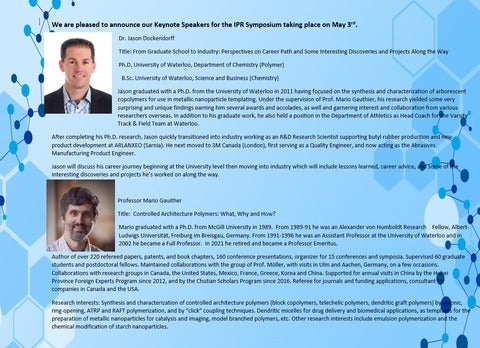The Institute of Polymer Research is excited to announce the upcoming Distinguished Lecture by Timothy M. Swager. Timothy is the John D. MacArthur Professor of Chemistry at the Massachusetts Institute of Technology. A native of Montana, he received a BS from Montana State University in 1983 and a Ph.D. from the California Institute of Technology in 1988. After a postdoctoral appointment at MIT he joined University of Pennsylvania 1990-1996 and returned to MIT in 1996 as a Professor of Chemistry and served as the Head of Chemistry from 2005-2010. He has published more than 500 peer-reviewed papers and more than 120 issued/pending patents. Swager’s honors include: Election to the National Academy of Sciences, an Honorary Doctorate from Montana State University, National Academy of Inventors Fellow, The Pauling Medal, The Lemelson-MIT Award for Invention and Innovation, and Election to the American Academy of Arts and Sciences. His research interests are in design, synthesis, and study of organic-based electronic, sensory, energy storage, membranes, liquid crystals, and colloids. He has founded five companies (DyNuPol, Iptyx, PolyJoule, C2 Sense and Xibus Systems).
He will be giving a presentation on Wednesday, October 25 at 11am in QNC 0101.
Intrinsically porous organic polymers in sensing and catalysis.
Some years ago we introduced the concept of fusing rigid 3D molecular building blocks into polymer backbones as a mechanism to create space between polymers. The first systems were conjugated poly(phenylene ethynylene)s with pentiptycene groups, which displayed robust emissive properties in thin films. These systems demonstrated size exclusion properties, amplified sensory responses as a result of excitonic transport, and led to the commercialization of the FidoTM explosives detectors, which 20 years after their introduction remain the most sensitive portable explosives sensors produced. The critical design principle that the 3D group must be fused within the polymer rather than simply be pendant has become a robust design principle and is fundamental to the design intrinsically porous organic polymers. We have a continuing interest in intrinsically porous polymeric materials, and I will detail our most recent emissive sensors for perfluoroalkyl substances (PFAS) that make use of excitonic transport to create high (ppt) sensitivity. Excitonic transport and the semiconducting properties of these materials need not be limited to sensing applications, and I will detail our demonstrations of the extension to photoredox catalysis. The combination of excitonic and charge (electrons or holes) transport is demonstrated to provide enhanced rates and higher efficiency in these processes. Catalytic porous organic polymers represent a new approach to heterogenous catalysis; therein the molecular environment can be tailored to meet or exceed the selectivity and activity of homogenous systems. Moreover, they enable the formation of durable catalysis coatings on the surfaces of impellers, glassware, magnetic particles, or tubing for recycling and use in flow reactors. In addition to photoredox, methods, I will briefly introduce catalytic polymers containing palladium that allow for high activities (>200,000 turnovers/metal center).





